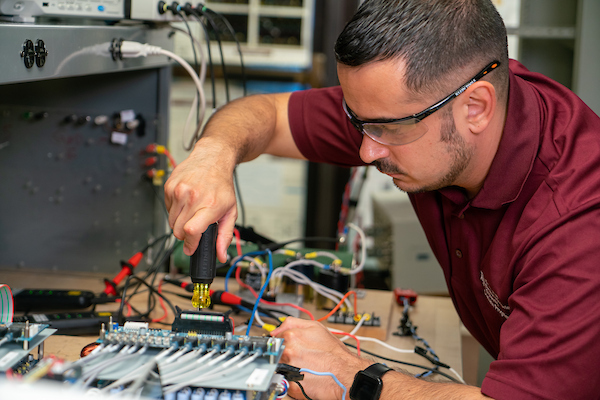Doctor of Philosophy - Electrical Engineering
Work leading to the degree of Doctor of Philosophy (PhD) is designed to give the candidate a thorough and comprehensive knowledge of his or her professional field and training in methods of research.
Students choose one of seven focus areas within the department, including 1) Analog and Mixed Signal, 2) Biomedical Imaging, Sensing and Genomic Signal Processing, 3) Device Science and Nanotechnology, 4) Energy and Power, 5) Electromagnetics and Microwaves, 6) Information Science and Systems, and 7) Computer Engineering Systems.
I'm ready to apply! Request Information
Students choose one of seven focus areas within the department, including 1) Analog and Mixed Signal, 2) Biomedical Imaging, Sensing and Genomic Signal Processing, 3) Device Science and Nanotechnology, 4) Energy and Power, 5) Electromagnetics and Microwaves, 6) Information Science and Systems, and 7) Computer Engineering Systems.
I'm ready to apply! Request Information

Overview
-
The final basis for granting the degree shall be the candidate’s grasp of the subject matter of a broad field of study and a demonstrated ability to do independent research. In addition, the candidate must have acquired the ability to express thoughts clearly and forcefully in both oral and written languages. The degree is not granted solely for the completion of coursework, residence and technical requirements, although these must be met.
-
The student’s advisory committee will evaluate the student’s previous education and degree objectives. The committee, in consultation with the student, will develop a proposed degree plan and outline a research problem which, when completed, as indicated by the dissertation (or its equivalent for the degree of Doctor of Education or the degree of Doctor of Engineering), will constitute the basic requirements for the degree.
The degree plan must be filed with the Graduate and Professional School prior to the deadline imposed by the student’s college and no later than 90 days prior to the preliminary examination.
Please refer to our course catalog for more course information.
-
The Department of Electrical and Computer Engineering offers financial assistance in the form of teaching assistantships, research assistantships, fellowships and scholarships to exceptional incoming graduate students.
Teaching assistantships, some fellowshipsand scholarships are administered by the department.
Research assistantships, some fellowshipsand scholarships are administered by the various areas of specialization and/or individual faculty members.
For more information on funding please visit our Graduate Funding Opportunities page and our Teaching Assistant Application page.
Degree Highlights
#13
Graduate program among public institutions | U.S News & World Report 2025
80
Faculty Researchers
280
Enrolled Ph.D. Students (Fall 2022)
